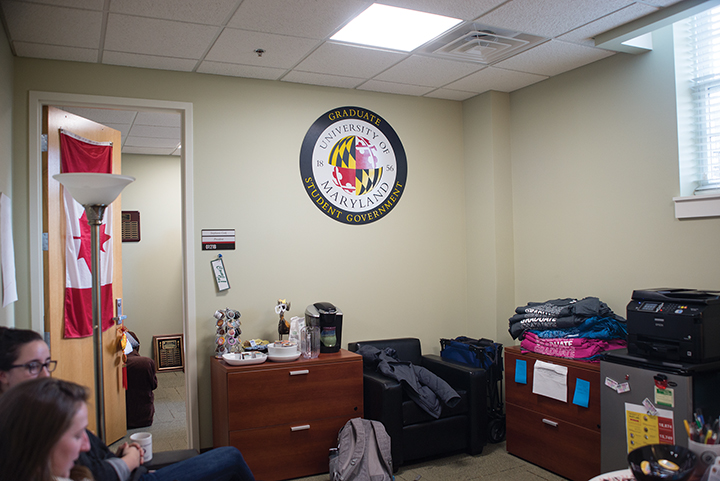Graduate students at the University of Maryland say they feel financially unsupported, according to recently released results of a 2017 quality of life survey.
More than 2,000 graduate students responded to the 90-question anonymous survey, which spanned topics including level of involvement on the campus and interactions with other graduate students. The survey did not directly ask students about their financial situations — respondents independently raised concerns in response to open-ended questions — but financial hardship was the most common theme among student answers to a question about displeasure with the university.
The survey — the first to be conducted on the graduate student population since 2010 — also asked students to provide feedback on aspects of their university experience, including the ways in which they do not feel supported and why they would not recommend this university’s graduate program. The 109-page report released by the Graduate School sorted responses by theme and presented excerpts from students’ comments.
Graduate Student Government Public Relations Vice President Katie Brown said the excerpts displayed in the report are reflective of the issues facing the graduate student body.
[Read more: UMD student coalition teams up with Maryland delegate to push collective bargaining rights]
“When you read these comments, people are really struggling,” she said. “It’s pretty rough and sad and speaks to the issues [the Fearless Student Employees Coalition] and [the Graduate Assistant Advisory Committee] have been raising.”
Both the Fearless Student Employees Coalition and Graduate Assistant Advisory Committee exist to advocate for the concerns of student workers at this university. Although the GAAC exclusively represents graduate assistants, the FSE serves all student workers on the campus, having worked with the GSG, the Student Government Association, the Student Labor Action Project and United Academics of Maryland.
Graduate students decried the “ridiculously low” stipend offered to them for their work on the campus and reported feeling unappreciated by this university. One comment described graduate student workers as “slave laborers.”
“We do all the grunt work and are the reason that many of the departments are able to function, and yet we see very little respect or financial compensation,” the comment read.
Communication doctoral student Janna Söder recognizes that it is her wife’s income as a nurse that makes it possible for their family to maintain their current standard of living. On her salary alone, “or even if we had my salary twice, we’d not be living here,” she said, adding that “with two kids, I probably would not finish graduate school.”
Söder’s status as an international student makes her position even more precarious, because under her visa, she is not able to hold an off-campus job.
“For international students, what they give you is what you have,” she said.
The Graduate Hills and Graduate Gardens are the only designated graduate housing unit partnered with this university, according to the Department of Resident Life’s website. The unit’s website places the starting monthly rental rate at $1,247 — to pay for an apartment year-round would cost roughly $15,000. This university’s minimum stipend for a nine-and-a-half month graduate assistantship is $16,144, according to the Graduate School’s website.
While the report begins with an executive summary that lists key trends in the data — featuring findings including factors that play into a graduate student’s decision to enroll at this university and how few students reported experiencing discrimination by other graduate students — missing from this summary is a discussion of graduate students’ financial issues.
Graduate School Assistant Dean Jeffrey Franke said this is because financial insecurity emerged in the comments, and the executive summary was only concerned with what was directly asked in the survey. He also noted that “we all know” graduate students’ financial struggles — they are already common knowledge.
“That was an issue that was there, but I wanted to raise other issues,” he said. “I don’t want everyone to focus on just the finances.”
But Brown disagreed, saying “the executive summary is supposed to highlight the main points, and I don’t think it spoke to some of the dark comments you saw.”
Franke said he will consider editing the executive summary so that it includes students’ financial insecurity in its key findings.
Of the total responses to the survey, only about 1,700 provided usable data, as some respondents did not provide their demographic information. In addition, the number of students who responded to each question varied — some 200-300 students provided feedback to the three open-ended questions included in the report.
While Franke acknowledged the results are not statistically significant, he said the survey was conducted “to give us a sense of what the student body is thinking, where they see the issues, what is on their minds.”
Brown is tired of studies, she said. She is ready for the administration to take action.
[Read more: UMD graduate students are frustrated with high rents and a lack of housing options]
“We’re at a point where we’ve been telling [the Graduate School] these issues exist,” she said. “Now I just hope that they’ll make some concrete policy changes and provide resources that will address some of these issues.”
Franke said he has already used the survey results in conversations regarding the need for affordable housing with city developers. He has also reached out to senior deans and staff at each college, he said.
“There is fatigue on the campus,” he said. “We do a lot of surveys, we ask a lot of people their opinion and nothing ever happens … I want everybody to know that I’m taking this seriously, that I’m using this.”



